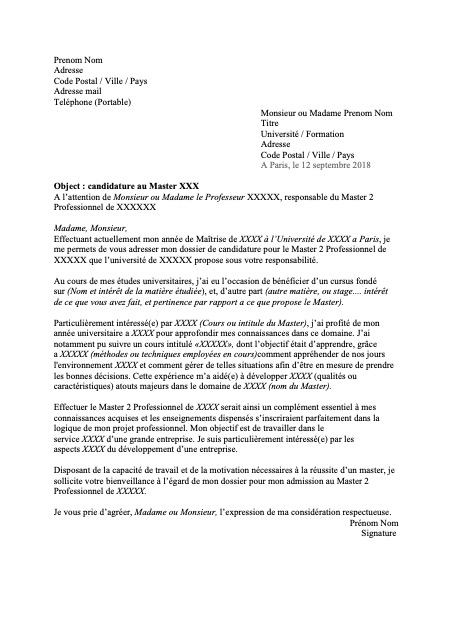What is a good cover letter?
Many of us have heard the term cover letter and have difficulty writing it. This article will try to explain this letter, the most important steps to follow to write it, and the difficulties encountered when writing your first cover letter.
Objectives of the cover letter
The cover letter is the mail that will be sent to an institution (company, association, training, university, etc…) to apply for the position or course that you are targeting.
The objective of a cover letter is to show your interlocutor, in a few sentences, that you have understood the institution’s positioning, that you will be able to bring to it your skills and succeed in the tasks that will be entrusted to you.
Attention: The recruiter wants to know if you can highlight your skills and/or experience.
The layout and plan of a cover letter
A cover letter should be structured in a standardized way. It should contain a header, a body, and a footer.
- The header contains :
➢Your contact information: name, address (optional), phone number
➢The name and contact information of the employer
➢The city and date of sending
➢The subject of the mailing (offering reference and job title)
- The body of your letter :
This part requires the most reflection; it is here that you will have to argue to defend your candidacy/your profile.
The body of the cover letter should be organized in three parts:
1- The introduction is intended to capture the attention of your interviewer. The aim is to show him/her that you have understood his/her company’s needs, the benefits of the course/school/training and that you are fully aware of the position/course offered.
2 – In the second part, you should introduce yourself by highlighting the assets you have for the position or course/school/training by relating your experience to the criteria requested.
3 – In the third part of your letter’s body, you will encourage your interlocutor to contact you ( most employers do it by proposing you an interview), and the main goal of the letter is to obtain this appointment.
We always end a cover letter or an e-mail with the politeness formula.
- The footer
Contains your first and last name and your signature.
Writing tips
- A catchy first paragraph
Think that the recruiter who will read your letter receives dozens of them every day, so you must immediately attract his attention, trying to make him want to keep reading. If you adopt the traditional “You / Me / We” plan, you need to highlight your skills from the first words. Choose, for example, an area of company presentation or course/school/training on which you can bounce back easily.
The cover letter should provide additional information to your CV. Its objective is not to describe your educational and professional background but to explain your interest and assets for the proposed position. Your letter should be structured around a coherent professional and personal project.
- Structured and well-written:
Ideally, the letter should be on a single page. It is important to air out the paragraphs, leave margins and spaces.
Don’t forget to proofread to eliminate any spelling mistakes.
- Customized :
The master letter is to be banned, as well as letters copied and pasted from the Internet! Avoid ready-made formulas and generalities that do not bring anything useful to your application. The recruiter should be stimulated to want to meet you thanks to targeted and personalized arguments. But beware, showing that you know a company does not mean plagiarizing its website or making many sentences in the “I love what you do so much, I’ve been dreaming of working for you since I was 10 years old…” mode.
- Make the most of your strengths:
Always highlight the most interesting skills for the position you are applying for. Give specific examples and figures to illustrate your arguments. For example, an IT specialist could indicate the number of visits to the websites he or she has created.
- The little extras…
If you are recommended by someone, mention it, it is a significant asset. Volunteering in an association, a rare language… It can also make a difference to your application.
Errors to avoid
- The copy-paste
- Mistakes
- Negative expressions
- The letter too talkative or too condensed
- Poor presentation
- Small errors like typos
- Important oversights
- Old formulas
- A text lacking grip on the company area
Do not hesitate to contact us if you need help or have any questions. Here is an example in French to help you with your cover letter: LM.UEE



